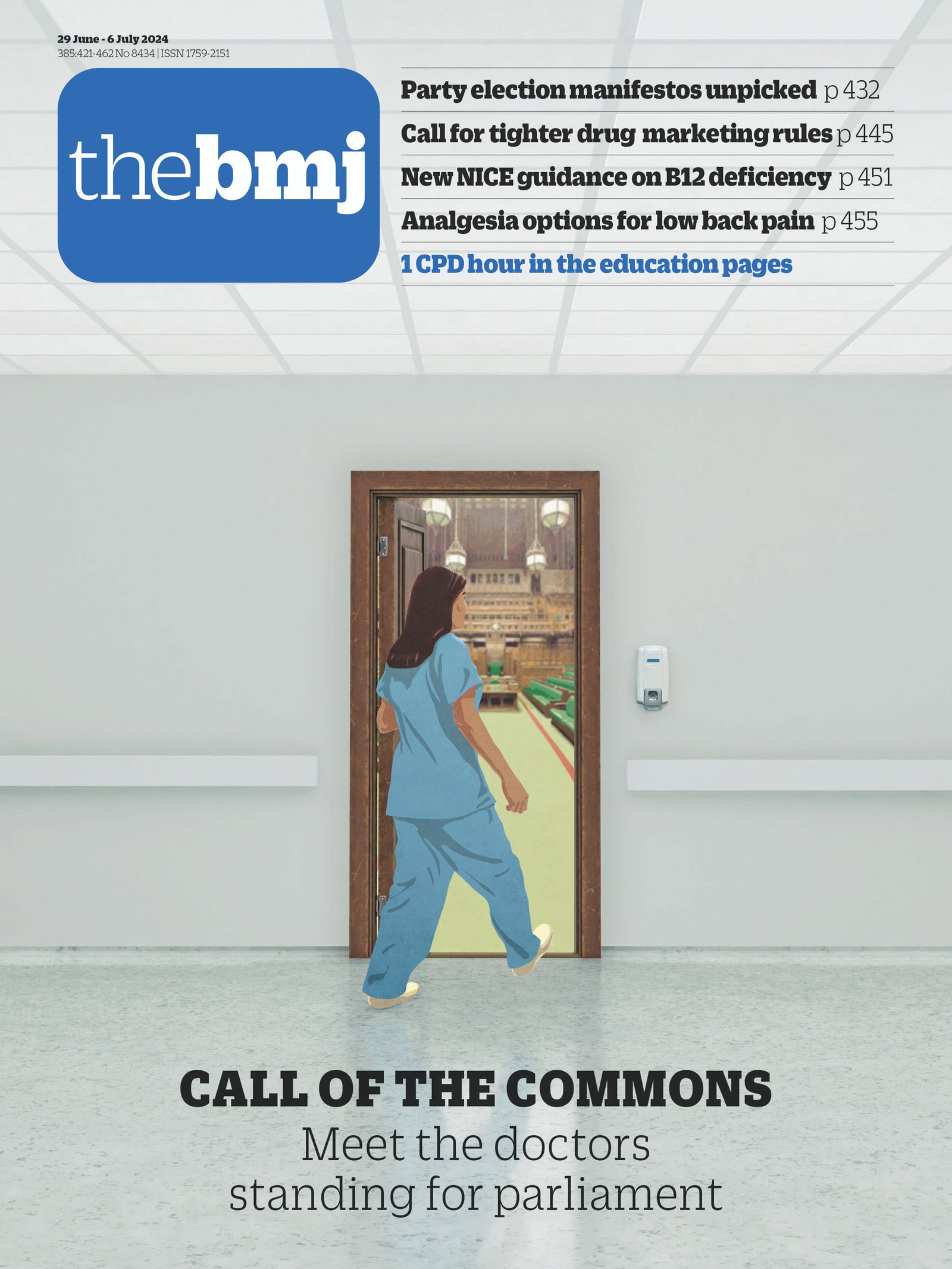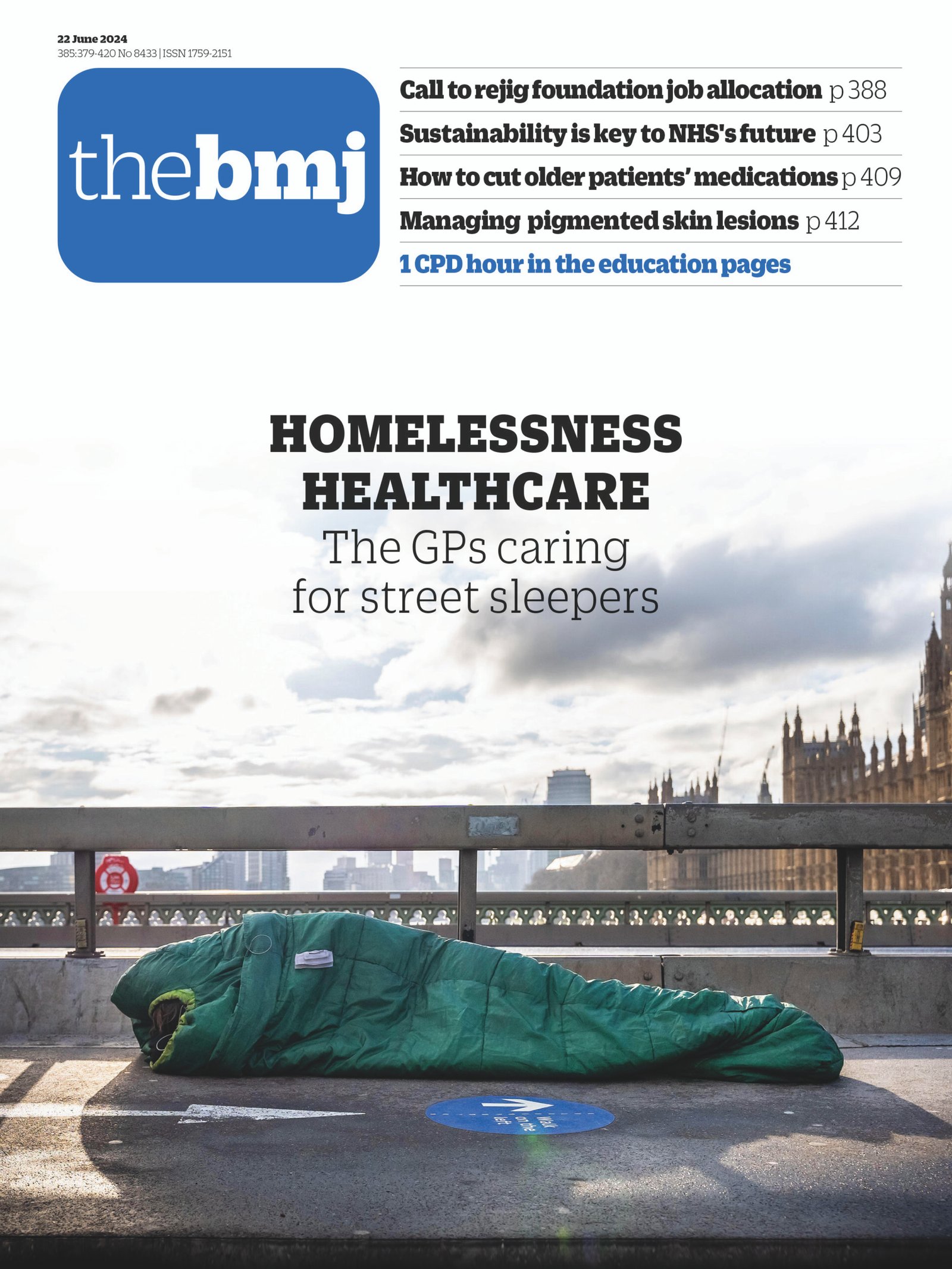- Fraz A. Mir, consultant physician
The UK population is set to go to the polls in a general election on 4 July in the midst of the European football championship. The National Health Service (NHS) has once again taken on its customary role as a political football. Remarkably, everyone seems to agree on one thing at least. Burgeoning hospital waiting lists, ongoing junior doctors strikes, overcrowded emergency departments, and scarcity of access to GP appointments, all point to serious systemic issues and a lack of funding that must be tackled.1 The NHS as a whole needs urgent resuscitation which requires some pretty drastic measures.
But the manifesto proposals from the main political parties at best amount to a sticking plaster over a Grand Canyon sized gaping wound.2 Politicians are failing to offer solutions to the root cause of the NHS crisis, which is as simple as it is obvious: the demand and expectations of the NHS far outweigh its current capability and capacity to supply and provide the health and social care needs of the UK’s 65 million or so people. Fixing the problem will require a major overhaul of NHS structures and processes, backed by adequate financing.

The NHS Act of 1946 enshrined into law the laudable principles of the newly proposed National Health Service: to be comprehensive and available to all, based on clinical need rather than an individual’s ability to pay, and to be funded entirely through national taxation. Over the decades, these principles have been eroded as demonstrated by the shift towards private dentistry, optometry, various surgical procedures, and prescription charges amply show. Private providers are significant players in healthcare provision, as illustrated by the Private Finance Initiative (PFI), which in an effort to keep funding for new hospitals and clinics “off the books,” has resulted in the public purse paying billions more than it would have done otherwise.3 Rationing of care is happening at all levels, both explicitly (e.g. treatments approved by NICE) and implicitly (e.g. waiting lists). Compared to other western countries, the NHS languishes in terms of health outcomes and worsening health inequalities.4 Nye Bevan once reportedly said that if a bedpan is dropped on a hospital floor in Tredegar (his South Wales constituency), its noise should resound in the Palace of Westminster. The collective inability to listen and silence from Parliament must have Bevan performing somersaults in his grave.
One of the challenges that the NHS faces is that the amazing advances in medical practice come with an expensive price tag. For example, if you had the misfortune of experiencing a myocardial infarction 50 years ago, you would be kept in hospital for days if not weeks (beds were much more readily available then) and been given some aspirin at best. Nowadays, a mild leak in serum troponin levels will often mean you are started on 7-8 drugs, and have stents inserted into your coronary arteries, costs for which run into thousands of pounds per patient. Similarly, in immunology and cancer care, where certain conditions previously had a very poor prognosis, newer treatments have heralded real hope and astonishing outcomes. CAR T-cell treatments for previously untreatable haematological malignancies are just one example. This is something to be celebrated, but each course of therapy, costs just shy of £300 000.5 Costs for healthcare will continue to increase as the population continues to diversify, the proportion of older patients rises exponentially, and those living with chronic illnesses like diabetes grows. Indeed, spending on the NHS has increased from 3.2% of GDP at around the time of its inception to 9.3% in 2022 and rising.6
So, it is clear, that despite what politicians say about better prevention, innovation, and greater efficiency, funding the NHS adequately to provide a comprehensive service through general taxation, but without raising them is simply not possible. However, none of the major political parties are prepared to take a political risk by openly saying so. Nor are they inclined to have a frank public discussion about what the nation’s priorities are, or how much they are willing to pay for them. We remain at an impasse—which is why we need to broaden out and open up the conversation. Setting up a royal commission on the NHS is one way in which we could do this.
A royal commission is a type of committee appointed for a specific investigatory or advisory purpose. There have been 34 royal commissions on a variety of issues since 1945 (but none since 1999).7 The monarch appoints its members from a variety of stakeholder groups on the government’s advice. Royal commissions are the highest level of public inquiry, dealing with issues of utmost importance to the nation. They typically gather and analyse evidence and then produce a report with recommendations for the government’s consideration. Although they are authoritative and independent of government, royal commissions cannot compel witnesses to give evidence, like in a public inquiry. In 2017, soon after Brexit, Saatchi and colleagues argued for setting up a royal commission for the NHS in The BMJ.8 Ironically, one of the counter arguments back then was that royal commissions are clunky and take too long to report, whereas alternative, speedier mechanisms ought to be explored instead. If set up with a clear remit and time frame, a royal commission could still be the best way to look at solutions for problems facing the NHS, in terms of structure, funding models, capacity, workforce and provision of social care. There is no reason why supplementary, more focused collaborative groups could not function with the aim to improve the health and social welfare system in parallel.
Seven years on from the Saatchi article, patients and healthcare professionals will tell you that things in the NHS are worse than ever. A royal commission may be the only mechanism via which to allow a robust debate across political lines involving experts and the public, to produce an acceptable shared vision and sustainable plan for the future. Unless urgent and radical action is taken now, the NHS faces an existential threat. Where once it was a truly world-class and universal system, envied around the world, it risks becoming a notional one at best, and its lofty principles confined to the history books. The forthcoming general election provides the context and the opportunity for real discussion and debate on the public’s key priorities. As one of the nation’s most cherished and beloved institutions, it is high time that the NHS gets the attention and care it so urgently deserves and needs.
Footnotes
-
Competing interests: none declared.
-
Provenance and peer review: not commissioned, not externally peer reviewed.
References
- ↵
- ↵
Election watch: What are the main parties promising on health? BMJ 2024; 385 doi:10.1136/bmj.q1223 (Published 03 June 2024)
- ↵
Private finance initiatives during NHS austerity BMJ 2011; 342 doi:10.1136/bmj.d324 (Published 09 February 2011)
- ↵
- ↵
- ↵
NHS funding for a secure future. BMJ 2024; 384 doi:10.1136/bmj-2024-079341 (Published 20 March 2024)
- ↵
- ↵
Should we have a royal commission on the NHS? BMJ 2017; 357 doi:10.1136/bmj.j1621 (Published 06 April 2017)










